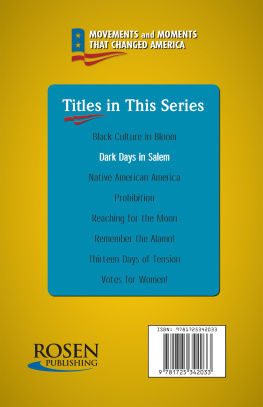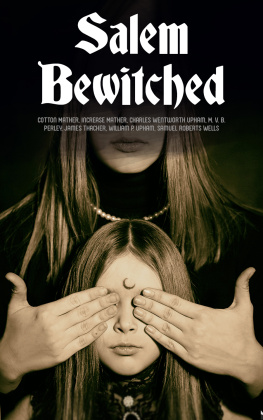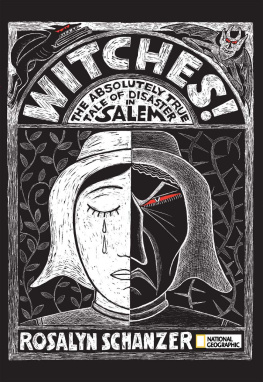Denial of Sudduceism in Salem: Caught in a Devils Cloyster for Witches
Kathy Lee Jones
Copyright 2016 WE CANT BE BEAT LLC
Table of Contents
Prologue
This is a work of fiction. Historical fiction takes an imaginary character and places that character into a historical situation. Abigail Bassett is such a character. Not all of the events that take place in this book actually took place, and in some areas the author has taken liberties with the passage of time in order to make the story flow in an interesting manner.
Yet with all of that said, attention has been paid to certain historical events and to the characters of people who lived in those times.
It was a very different world a place where religion was taken very seriously and something as simple as hand washing could signal paying too much attention to ones own body.
Sadduceism denied that there were such things as ghosts, goblins, demons and witches. It advocated rational thought. However, there were those who believed that by denying these supernatural beings, one denied God.
The following is an excerpt from a book printed in 1641, by Richard Bovet:
Pandaemonium, or, The devil's cloyster being a further blow to modern sadduceism, proving the existence of witches and spirits, in a discourse deduced from the fall of the angels, the propagation of Satans kingdom before the flood, the idolatry of the ages after greatly advancing diabolical confederacies, with an account of the lives and transactions of several notorious witches : also, a collection of several authentick relations of strange apparitions of dmons and spectres, and fascinations of witches, never before printed
Bovet, Richard, b. ca. 1641
Today, we derive the word Pandemonium from this text and similar ones. To us, the term refers to confusion with a lot of noise. Cloyster is an archaic spelling of cloister, which can either be a covered walk in a religious house or college (once much the same thing) or a retreat where nuns or monks reside.
From a timeline of the true historical events which took place in Salem Village, from writings about other events of the time, and from a healthy dose of imagination, we bring to you this tale.
Chapter 1: Hope for a Rational Life
Abigail Bassett avoided the gush of fluid as the woman prisoner delivered a healthy baby boy. Dispassionately, she stepped out of her last petticoat, assisted by one of the other women prisoners, and waited as the woman tore the garment in half. She moistened a strip from a teacup of water, and set about cleaning the baby while Abigail saw to the woman. The mother was gaunt and filthy they all were after 18 months in gaol. There had been four other babies in their cell, and Abigail was down to her last petticoat. No doubt she would be censured for being indecently clothed, although her stout, linsey-woolsey gown covered her from neck to ankle.
Abigail was both thankful and regretful that her husband, David Bassett, had not succeeded in making her pregnant before they were arrested. Thankful because a gaol was no place to nurture a babe. Regretful, because David had quixotically tried to shield one of their older congregation members, and had been struck down for his trouble. The older man had been killed as well. Wed not even quite one month, Abigail Bassett was now Widow Bassett. More than that, she had been arrested for idolatry. Abigail Bassett was a Member of the Society of Friends of Jesus a Quaker.
The baby gave a thin, mewling cry nothing like that of a healthy babe. And the woman who had been cleaning him approached, having swaddled the infant in half of the petticoat. Among them, they made the mother and child as comfortable as they could. One woman had scraped up the cleanest of the filthy straw, and another had from somewhere about her person produced a passably clean shawl to cover it. The oldest of the children Abigail had delivered here toddled near, curious about the new arrival. Her thin little face was smudged with dirt, and her thin, wispy locks were tangled. She wore a remnant of one of her mothers petticoats that woman having also been well-dressed when they were herded together into the cell. That woman had nursed the girl long past normal weaning age, in the hope of prolonging both their lives. But, alas, the mother had gone to the gallows a week ago, Now, the little one subsisted on such scraps as her cell mates would spare her which was precious little.
Perhaps the little girl hoped that the new mother would share the bounty of her breasts, but that was unlikely. It would be a miracle if the woman would have enough to feed her own infant.
Abigail carefully cleaned her hands of the blood and birthing fluid with a tiny scrap of the cloth from her petticoat. Reflexively, she silently gave thanks for the delivery of new life into the world. Then, just as silently, she prayed heartily for their deliverance. She restrained herself from entering into the trembling ecstasy of religious fervor.
It almost seemed as if her prayer might have been answered, for there came a clattering at the door. We be turnin ye lot out, a guard said roughly, Ye be pardoned an are free to go.
Abigail turned reflexively toward the woman on the makeshift pallet. But the young mother had already struggled up, and leaned on the arm of one of the others. I am ready, the young woman said, Better to die on the streets than in here.
The guard laughed rudely. An that may well be just what ye do, slut. It do be bitter without.
The guard delivered them to the exit door, and shut it with a clang behind them. There was a thin mist, and the wind cut through Abigails linsey-woolsey, cold almost to the point of pain. For a moment the women huddled together, trying to allay the cold with their body heat none willing to acknowledge the terror that filled them all. For where could they go? Who would take them in?
Then out of the misting rain figures slipped furtively in. Family members who had not embraced their faith, a husband or two, sisters they took the women away to succor them in back rooms where they could hide, because it was still not safe for women to be alone, and very little safety for heretics.
But alone was what Abigail was, when the last of them was taken away. She knew where she stood, and turned her face toward the docks. She and David had walked there often, and had gone to meeting in a house not far from the waterfront. They had spoken often of sailing to the new world if they could but find a berth.
On the day that she was arrested and David killed, they had gone to meeting. One of the elders had been moved to speak a long prosy lecture about the Sadducees and the Pharisees. The elder had explained that the Sadducees had been devoted to reason. They had considered parts of the Bible as myth; whereas the Pharisees had considered it the word of God, Most Highest. The elder the very man that David had moved to protect went on to say that there were movements in the modern world that would use these ancient arguments to their own benefit. He pointed out that the learned man, Richard Bovet, took the view that disproving Sadduceism the desire to pick and choose parts of the Bible proved the existence of witches, demons and other malevolent beings.
Which was right? the elder had asked. I know not. I believe, however, that Jesus set aside both and told us to be still and listen. The elder had just prepared to seat himself again, having said all that he had felt moved to say when the door burst open, and chaos had ensued.
Abigail had reached the dockside, and stood looking out to sea. She shivered in her dress, worn thin from nearly two years of continuous wear. She missed that last petticoat, and she missed the warm, woolen cloak her mother had given her left behind on a peg in the home that had served as a meeting house. She needed a place to stay, and she needed decent clothing. But how she was to obtain either dressed as she was she had no idea. She did not weep. Her tears had been used up long ago.
Next page














